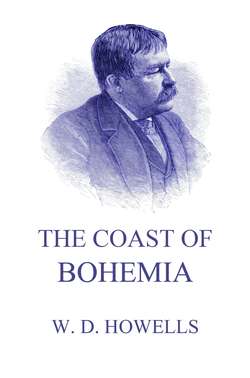Читать книгу The Coast Of Bohemia - William Dean Howells - Страница 5
На сайте Литреса книга снята с продажи.
ОглавлениеI.
The forty-sixth annual fair of the Pymantoning County Agricultural Society was in its second day. The trotting-matches had begun, and the vast majority of the visitors had abandoned the other features of the exhibition for this supreme attraction. They clustered four or five deep along the half-mile of railing that enclosed the track, and sat sweltering in the hot September sun, on the benching of the grandstand that flanked a stretch of the course. Boys selling lemonade and peanuts, and other boys with the score of the races, made their way up and down the seats with shrill cries; now and then there was a shriek of girls' laughter from a group of young people calling to some other group, or struggling for a programme caught back and forth; the young fellows shouted to each other jokes that were lost in mid-air; but, for the most part, the crowd was a very silent one, grimly intent upon the rival sulkies as they flashed by and lost themselves in the clouds that thickened over the distances of the long, dusty loop. Here and there some one gave a shout as a horse broke, or settled down to his work under the guttural snarl of his driver; at times the whole throng burst into impartial applause as a horse gained or lost a length; but the quick throb of the hoofs on the velvety earth and the whir of the flying wheels were the sounds that chiefly made themselves heard.
The spectacle had the importance which multitude givers, and Ludlow found in it the effects which he hoped to get again in his impression. He saw the deep purples which he looked to see with eyes trained by the French masters of his school to find them, and the indigo blues, the intense greens, the rainbow oranges and scarlets; and he knew just how he should give them. In the light of that vast afternoon sky, cloudless, crystalline in its clearness, no brilliancy of rendering could be too bold.
If he had the courage of his convictions, this purely American event could be reported on his canvas with all its native character; and yet it could be made to appeal to the enlightened eye with the charm of a French subject, and impressionism could be fully justified of its follower in Pymantoning as well as in Paris. That golden dust along the track; the level tops of the buggies drawn up within its ellipse, and the groups scattered about in gypsy gayety on the grass there; the dark blur of men behind the barrier; the women, with their bright hats and parasols, massed flower-like,—all made him long to express them in lines and dots and breadths of pure color. He had caught the vital effect of the whole, and he meant to interpret it so that its truth should be felt by all who had received the light of the new faith in painting, who believed in the prismatic colors as in the ten commandments, and who hoped to be saved by tone-contrasts. For the others, Ludlow was at that day too fanatical an impressionist to care. He owed a duty to France no less than to America, and he wished to fulfil it in a picture which should at once testify to the excellence of the French method and the American material. At twenty-two, one is often much more secure and final in one's conclusions than one is afterwards.
He was vexed that a lingering doubt of the subject had kept him from bringing a canvas with him at once, and recording his precious first glimpses of it. But he meant to come to the trotting-match the next day again, and then he hoped to get back to his primal impression of the scene, now so vivid in his mind. He made his way down the benches, and out of the enclosure of the track. He drew a deep breath, full of the sweet smell of the bruised grass, forsaken now by nearly all the feet that had trodden it. A few old farmers, who had failed to get places along the railing and had not cared to pay for seats on the stand, were loitering about, followed by their baffled and disappointed wives. The men occasionally stopped at the cattle-pens, but it was less to look at the bulls and boars and rams which had taken the premiums, and wore cards or ribbons certifying the fact, than to escape a consciousness of their partners, harassingly taciturn or voluble in their reproach. A number of these embittered women brokenly fringed the piazza of the fair-house, and Ludlow made his way toward them with due sympathy for their poor little tragedy, so intelligible to him through the memories of his own country-bred youth. He followed with his pity those who sulked away through the deserted aisles of the building, and nursed their grievance among the prize fruits and vegetables, and the fruits and vegetables that had not taken the prizes. They were more censorious than they would have been perhaps if they had not been defeated themselves; he heard them dispute the wisdom of most of the awards as the shoutings and clappings from the racetrack penetrated the lonely hall. They creaked wearily up and down in their new shoes or best shoes, and he knew how they wished themselves at home and in bed, and wondered why they had ever been such fools as to come, anyway. Occasionally, one of their husbands lagged in, as if in search of his wife, but kept at a safe distance, after seeing her, or hung about with a group of other husbands, who could not be put to shame or suffering as they might if they had appeared singly.
